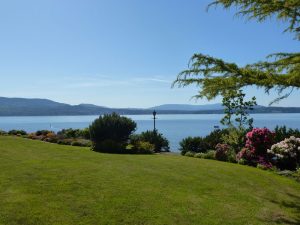 A television ad last evening showed a glorious sunset. It reminded me of the beautiful sunsets I regularly witness from this location. It challenged me to explain the reasons why I am so thankful for this life I enjoy here.
A television ad last evening showed a glorious sunset. It reminded me of the beautiful sunsets I regularly witness from this location. It challenged me to explain the reasons why I am so thankful for this life I enjoy here.
My story begins with finding this beautiful seaside location. It is 1.9 acres of waterfront with views of Patricia Bay, Mill Bay and farther out to Satellite Channel. After a full year of seeking properties with one Realtor in the Victoria area, and with another Realtor in Richmond, seeking a place for us to live where my husband could fly directly to his employment on North Vancouver Island. We fell in love with this acreage, on one September evening, during our first sunset viewing. Yes, I am indeed fortunate to live where I do.
I live alone here now, in the home we built together, but I am not lonely. Because of the 45 years of love and partnership we spent together, nearly 30 years of them here, evidence of Dale is all around me. There are memories in pictures to enjoy, a home built to suit our specifications, by a well certified builder and with a garden we created together in cooperation.
The shrubs and hedges are mature, their nests produce baby birds. I can watch a bald eagle perched on a waterfront tree, as he looks for his dinner. Occasionally I see a peregrine falcon, often hear the call of a sassy blue jay or raven and always there are crows and sea gulls who seem to enjoy my new roof.
The ocean before me is filled with activity every day. Occasionally porpoises frolic through the bay, always there are seals and river otter to watch. On calm days there are paddle boarders, some with a dog or babe in life jacket, along for the ride. Frequently I watch kayakers who appear to appreciate the water as I do. On warm summer days I can, and do, swim on the incoming tide.
I have so much more to be thankful for. It includes three adult children, each established in their own satisfying career. In these difficult times of staying at home, they are living on sizable pieces of land that they each own. There is plenty of worthwhile work to be done without having to leave the property.
I am most grateful for having three delightfully different grandchildren, whose parents have taught and encouraged them in fields of endeavour, and interests they seek. School is at home just now, and that means in addition to the usual farm chores at 7:30 AM, each one takes some responsibility for part of the household jobs in order to be ready by 9:00 for a school to start in their rooms. With a short recess break with a snack and some physical activity, lesson time is usually finished by noon.
I have every reason to be grateful, with only one exception. At this time in our ‘unhinged’ world — that’s how it sometimes feels — I cannot travel to be able to hug these young ones. But I do now have their email address and have begun to use it.
Note: This piece was written during the pandemic lock-down.
